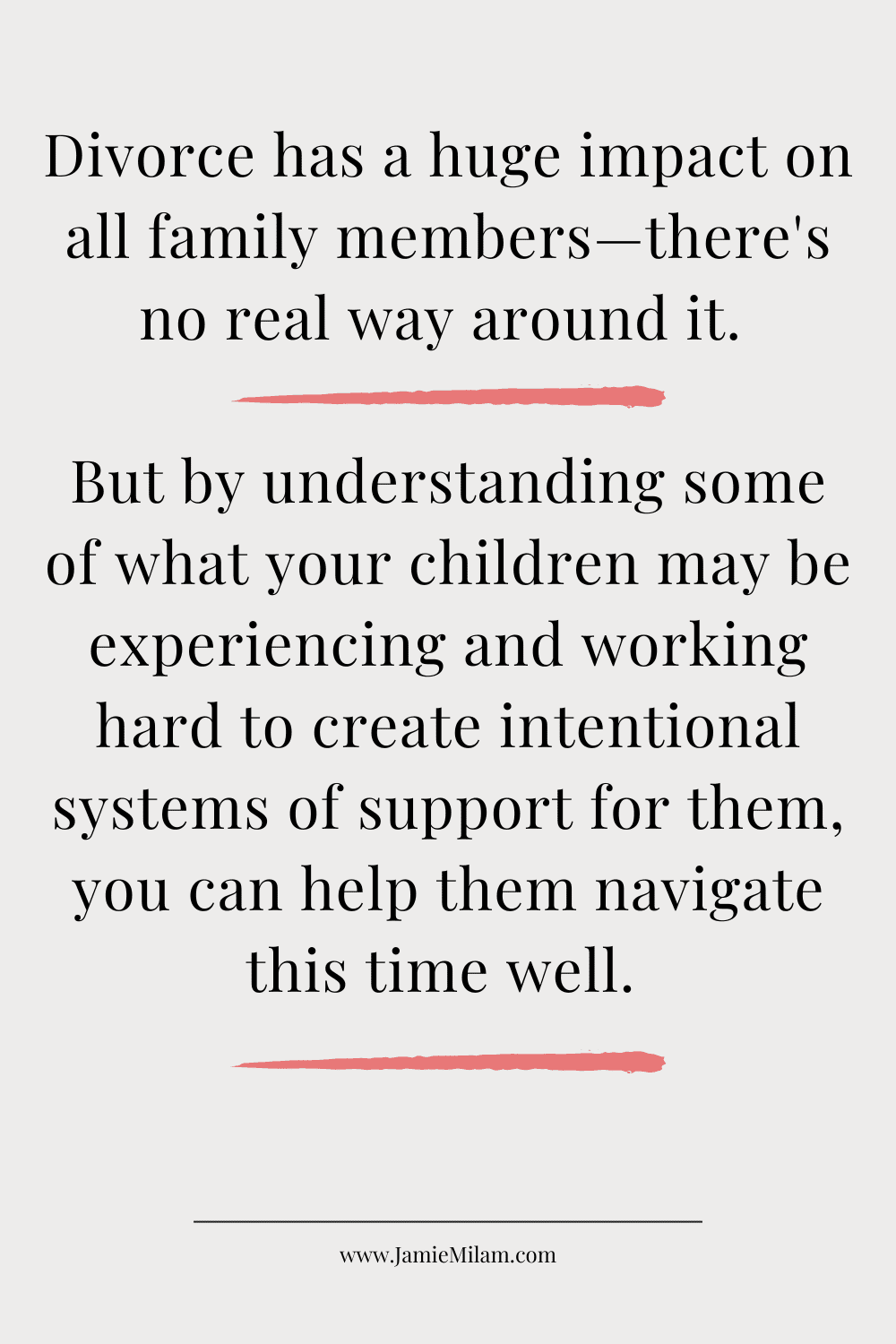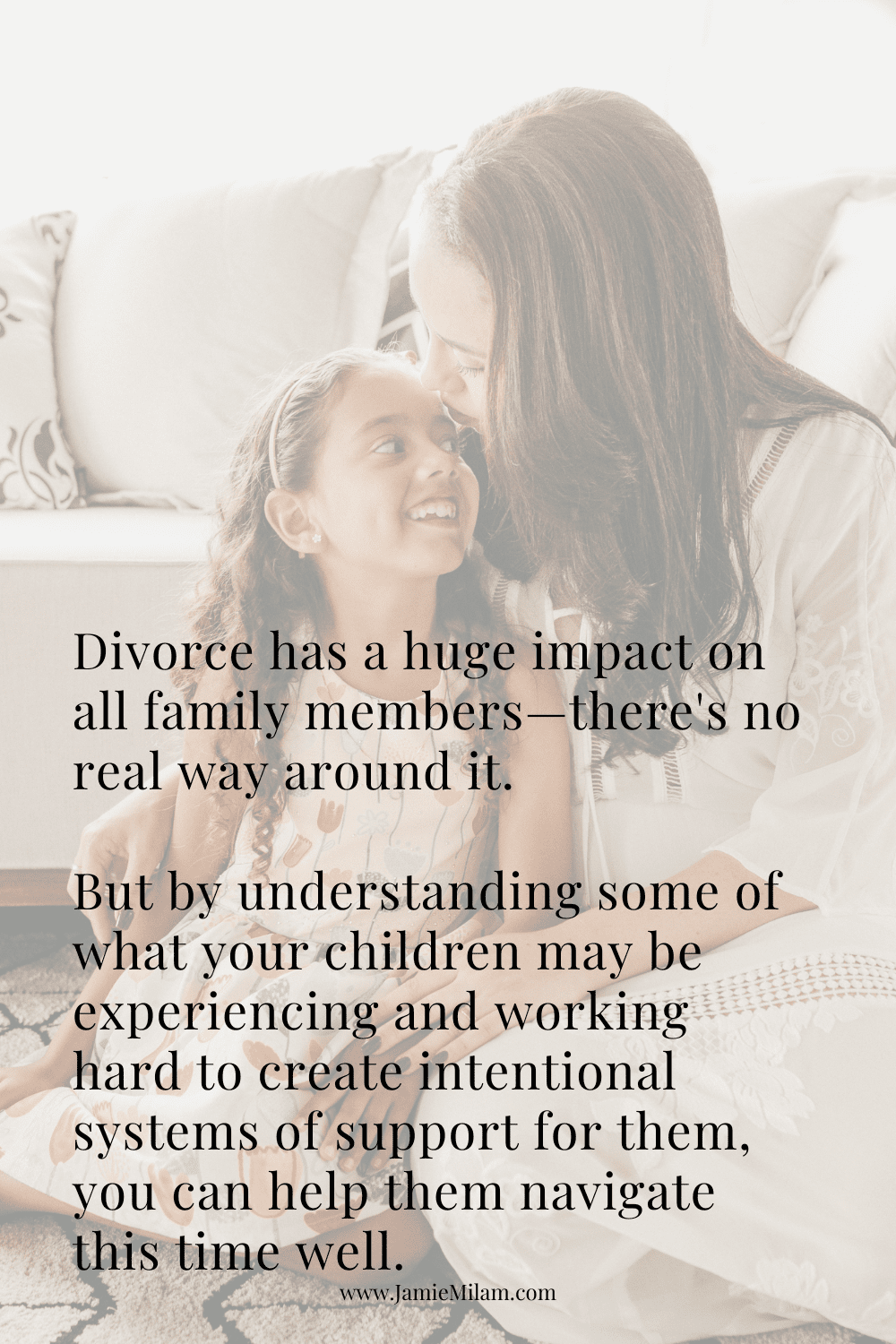THE BLOG
THE BLOG
*This website uses affiliate links which may earn a commission at no additional cost to you. As an Amazon addict and Associate, I earn from qualifying purchases, but I'm only recommending products I love!
Browse More Blog Posts:

Supporting Your Kids Through Divorce:
What to Expect and How to Deal
Whether it's a new school, a friendship fallout, a different neighborhood, or divorcing parents—transitions are hard for children.
Transitions are hard for adults, too, but our kids—especially the little ones—don't know how to communicate what they're experiencing and don't know how to navigate all the complex emotions. This can, in turn, impact their behavior and future decision-making in a big way.
It's our responsibility as parents to help ease these transitions and actively support and help them through it.
Divorce has a huge impact on all family members—there's no real way around it. But by understanding some of what your children may be experiencing and working hard to create intentional systems of support for them, you can help them navigate this time well.
Here we'll dive into what to expect and how to support your children when navigating divorce, with four practical steps to implement today.
Kids and Divorce: What to Expect
Because children spend such a significant amount of time at school, it's a place where the behavioral changes and impacts of divorce are most obvious. Natalie Parmenter, founder of Primary Focus and a former elementary school educator, joined us on episode 66 of the Divorced and Determined AF podcast to discuss these dynamics.
In Natalie's experience, children with divorcing parents may exhibit behaviors such as:
- Acting withdrawn and quiet, "checking out" or appearing sullen
- Becoming overactive and attention-seeking
- Seeking affirmation from the teacher as a parent figure
Children's personality types and their home situations impact how they behave in these situations. But when home life is in a season of change—they may be moving between houses or things are different—children look for stability. Their teacher is often a parent figure to them, and they often become more clingy or seek attention at school.

Some of the changes at home will impact the child's behavior. It may be harder for them to complete homework, they may be unsure about their routines, or they may hold on to comfort items like stuffed animals at school. Keeping the teacher aware of the situation is important so they can support your child in class—they can be on the lookout for any behavioral changes and adjust accordingly.
Another key dynamic in divorce that impacts kids is parenting styles. As divorcing couples navigate how to co-parent well, there are bound to be some bumps in the road based on different values, priorities, schedules, etc. This can impact things like:
- Routines and schedules: Children may go to bed on time and get a good night's sleep at one parent's house and then be totally thrown off routine the next week at the other parent's house.
- Academic performance: Some households are on top of things like homework, while others aren't. This impacts children's ability to learn and progress in their studies, so it may be something to talk to their teacher about.
- Communication: Simple reminders or notices can be missed if co-parents don't prioritize consistent communication. It's important everyone is kept in the loop so key information isn't missed.
Couples get divorced for a reason, and different parenting styles or values may be one of them. But no matter the reason, co-parents need to work together to ensure tension and friction are not felt by their children.
Teenagers and Divorce: What to Expect
If you're the parent to a teenager, things look a little different. They understand what's happening more than young children and have their own thoughts, ideas, opinions, and feelings on the whole thing... and they'll for sure let you know it in their teenager way!
We can be tempted to assume our teens are mature enough to handle more information than young children, but you still need to have wisdom and hold boundaries in what you communicate with them.
Episode 74 and episode 75 of the Divorced and Determined AF podcast discuss exactly how to approach this discussion with your teenagers. Ann Coleman, the expert I talked to, shares some key things to expect when navigating this situation:
- They may have questions—you don't have to provide answers. Teenagers may want to know more details than a younger child would, but that doesn't mean you should give all the nitty-gritty details. Don't add a burden onto them by sharing too much information, but keep things brief and focused on how you love and support your child.
- They may have opinions—you can consider these in your decisions. Unlike younger children, teenagers are likely to have more opinions and ideas about what's happening. Changing houses or schools has a huge impact on their life and they may be very resistant to it. If there are a few options available, you may choose to talk to them and see what they prefer, honoring their opinions. However, in some situations, there is only one option and, even if they don't like it, you have to move forward. In this case, keep your communication clear and loving, supporting them through the transition.
- They will have emotions—help them navigate it. Divorce is an emotionally volatile time, for all parties. As you are navigating your own emotions, so is your teenager. Help them learn to emotionally regulate by first taking care of yourself (therapy, self-care, journaling, etc.) and then introduce those same tools to your children and help them navigate through this situation. Remember, they're also in a developmental stage that's forming relationships too. So it's important to shield them from your marital struggles, as best as you can, to encourage healthy development too.

Your teenagers can understand and communicate more than young children, so you actually have a unique opportunity to build an even stronger connection with them by prioritizing open communication throughout this process.
4 Practical Tips to Support Your Children Through Divorce
The reality is each situation, each divorce, and each child is unique so there's no perfect roadmap to navigate this situation. However, there are some good practices and strategies to implement to help support your children through a tough season.
Here are four key tips to keep in mind:
1. Communicate, communicate, communicate
While you don't need share all your personal information with everyone in your child's life, keeping key people in the loop is important. This is particularly true with their teachers and educators—they see your child all the time and need to know what's going on.
So, without oversharing, let your child's teacher know key developments like:
- When you've told the child about a divorce and there are pending changes
- What the new routine is (i.e., pick-up, switching houses)
- Key people in your child's life and who they're living with or spending time with
- Updates to legal guardianship, custody arrangements, or pick-up permissions
By keeping the teacher in the loop, they can proactively support your child.

2. Determine Your Co-Parenting Communication Style
Divorcing couples who are co-parenting their children may find it hard to communicate consistently with each other and their child's teachers or other important people. Different parenting styles and values are often a reason for divorce in the first place, so both may be approaching situations differently.
That's why it's important to have a communication plan in place when it comes to your child's education. Co-parents can:
- Copy each other in all emails together. This takes commitment to do and often falls to the teacher to ensure they are all on the same page.
- Use a joint email address that both parents have access to and can communicate with.
- Assign one parent as the default communicator with the teacher and then it's that parent's responsibility to pass on pertinent information.
A fantastic tool to help you on your co-parenting journey is an app called Our Family Wizard, an all-in-one tool that can help you keep others in the loop on important dates, appointments & more. You can even customize who has access to different elements. Whichever option you choose, discuss a specific strategy that's consistent and ensures everyone is on the same page.
3. Keep It Brief and Clear
When it comes to talking about your divorce with your children (at any age), remember to keep things brief and clear. Resist the urge to overshare and do not provide all the details of what's going on. They're your children, not your friends, peers, or therapists—some things need to stay private.
Here are some tips:
- Remind your child of your love and support
- Present a united front (when possible) with your ex so the child knows you are both on their side
- Offer clear information about changing routines and living circumstances
- Avoid putting your kids in the middle of you and your ex
Along with the initial conversation, keep all your conversations about your ex brief and cordial. Trashing them or giving too many details about what they're doing can be very harmful to your children.
4. Foster Connection Through Openness and Empathy
This is geared more towards older children and teenagers and is important to help build strong connections with your children during divorce. It's so important to foster empathy and open communication so they know you're supporting them. You can do this in a few key ways:
- Let them know you're here to talk, but don't force it. Some teenagers will want to talk and others won't. Make sure you are checking in regularly to give them that space to open up and share what's on their mind.
- Respect and affirm their opinions and feelings. Teenagers are in a key developmental time where they are discovering who they are, and that comes with a lot of emotions. Be there, listen, affirm how they're feeling, allow them to express themselves, and have open conversations.
- Offer counseling. If you can afford it, set up some therapy sessions for your teenager so they have a safe, neutral space to process some of these things with.
These are just a few tips to help navigate a season of divorce with your children. Check out the podcast episodes mentioned for a deeper dive into the topic.
Even though none of this is easy, you can make it easier. You love your children and are 100% capable of smoothing out the bumpy road of divorce for your children and help them navigate big life changes.
To supporting our kids,

Save this post to come back to or share with a friend!

About Me
I'm Jamie Milam, a determined AF woman who's embraced life after divorce by finding peace through self-awareness, intentional decision-making, and thrilling new travel adventures.
As a Realtor® in Charlotte, NC (and your connection to top agents nationwide), I’m passionate about guiding you through your homeownership and design goals—while also helping you create space for the things you love. My mission is to empower you to create a life of alignment too - at home, abroad, and within.
Whether it’s through real estate tips, home design inspiration, or solo travel experiences for divorced, independent women, I hope this space encourages you to discover deeper self-awareness and build a life that aligns with your passions and needs.
Have you scoped the podcast series that empowers women to make aligned decisions in a divorce?

Your Free Charlotte City Guide

Jamie Milam is a Realtor® in the Charlotte, NC area, licensed in both NC & SC, and has the ability to refer you to a number of agent partners across the nation, regardless of where you may live. She is an enthusiast for the power of awareness and believes it can be used in all facets of life to support aligned living.
**Disclosure** This post may contain affiliate links and they are at no additional cost to you, though I may earn a small commission. Don't worry, I only recommend products or services that I have tried or believe would be of great value to you! All opinions expressed are those of my own!
Recent Posts
There's More ▾
There's More ▾
Let me share the goods!
Come from contribution, that's a motto I've valued for years! So... that's exactly what I am to provide you, straight into your inbox each week! No fluff and all open-book. Inspiring you to practice awareness, value your authentic self, and implement strategic actions so you can create alignment in your world to live the life you desire and deserve!









